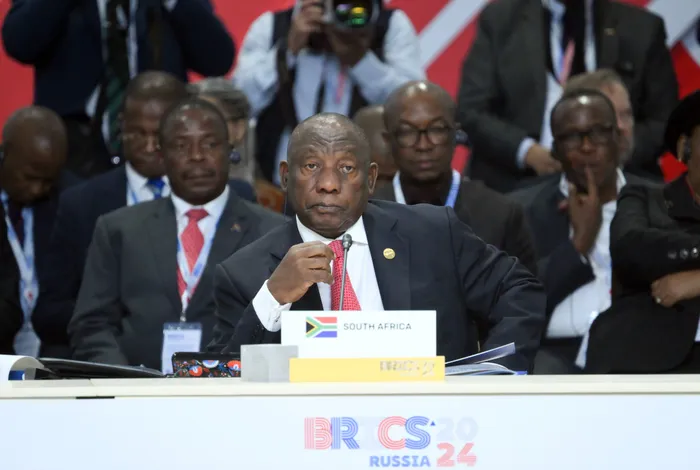Major outcomes and possibilities for the Global South

South African President at 16th BRICS Summit held in Kazan, Russia on 22-24 October, 2024. The BRICS Plus bloc and its growth in all regions in a fracturing multilateral order is a testament to its relevance, durability and values of inclusion in an age where humanity- and the planet needs global and regional cooperation for its survival, says the writers. Picture: GCIS
Ashraf Patel and Mika Kubayi
The world in 2024 faces dystopian, multilevel geopolitical-geoeconomic fractures, wars, and climate emergencies. In this context, the BRICS 2024 summit held in Kazan, Russia in late October was an important platform for seeking balance, global development, and reforming global institutions.
Following close on the United Nations General Assembly (UNGA)’s adoption of the Pact for the Future (PFTF) in September 2024, which focussed on the correctness of global reform and an intergenerational development agenda.
According to Atlantic Council scholar, Hung Tran:
“It is a mistake for the West to dismiss the power of symbolism and narratives in the geopolitical competition for global influence. The BRICS summit has also produced noteworthy results that the international community should know. First, Vladimir Putin chaired a successful summit involving thirty-six countries, most of which were represented by heads of state. In doing so, the Russian president showed that he had not been isolated in the international arena by the West following his invasion of Ukraine. (Tran, 2024)
Instead, Putin has deepened relationships with Global South countries through BRICS and other initiatives such as riding the anti-colonial wave to make headways in Western Africa.
The Kazan summit’s 32-page outcomes declaration covers the fall gamut of important global issues - from UN and Bretton Woods institutions reforms to new approaches to climate change and climate finance, to a more nuanced Partnership of 4IR and regulating AI to peace and security, terrorism, education, science, culture, sport and people to people exchange-related issues, which are all vital for global social cohesion.
As Chair of BRICS 2024, President Putin's opening statements diagnose the current state of affairs:
“BRICS members must discuss all these issues with countries from the Global South and East that share our approach. All our countries share similar aspirations, values and a vision of a new democratic world order that reflects cultural and civilisational diversity.”
The big takeaways from Kazan Summit, 2024
FINANCIAL INNOVATION:
"We welcome the BRICS Interbank Cooperation Mechanism (ICM) focus on facilitating and expanding innovative financial practices and approaches for projects and programmes, including finding acceptable mechanisms of financing in local currencies."
THE IMF:
"We reaffirm our commitment to maintaining a strong and effective Global Financial Safety Net with a quota-based and adequately resourced IMF at its centre."
G20:
"We recognise the importance of the continued and productive functioning of the G20, based on consensus with a focus on result-oriented outcomes." One can interpret this statement as showing the confidence of core BRICS nations within the G20, and by communicating that the G20 to focus on its core mandate which is global financial reform, the BRICS nations are leveraging also cautioning G20 to not encroach on UN themes and focus purely on financial system reforms.
PREVENTION OF FUTURE PANDEMICS:
"We support the initiatives of the BRICS R&D Vaccine Centre, further development of the BRICS Integrated Early Warning System for preventing mass infectious diseases risks." The COVIS nationalism experience was deliberation for most of the Global South and Africa, where Global Pharmaceuticals focused on profits above life. BRICS nations are committed to developing vaccines using a public goods approach and advocating for IP exceptions at the WHO and WIPO
THE MIDDLE EAST:
"We reiterate our grave concern at the deterioration of the situation and humanitarian crisis in the Occupied Palestinian Territory, in particular the unprecedented escalation of violence in the Gaza Strip and the West Bank as a result of the Israeli military offensive, which led to mass killing and injury of civilians, forced displacement and widespread destruction of civilian infrastructure."
"We express alarm over the situation in Southern Lebanon. We condemn the loss of civilian lives and the immense damage to civilian infrastructure resulting from attacks by Israel in residential areas in Lebanon and call for immediate cessation of military acts."
WESTERN SANCTIONS:
"We are deeply concerned about the disruptive effect of unlawful unilateral coercive measures, including illegal sanctions, on the world economy, international trade, and the achievement of the sustainable development goals."
THE INTERNATIONAL FINANCIAL SYSTEM'S REFORM:
"We underscore the need to reform the current international financial architecture to meet the global financial challenges including global economic governance to make the international financial architecture more inclusive and just."
BRICS GRAIN EXCHANGE:
"We welcome the initiative of the Russian side to establish a grain (commodities) trading platform within BRICS (the BRICS Grain Exchange) and to subsequently develop it including expanding it to other agricultural sectors."
BRICS CROSS-BORDER PAYMENT SYSTEM:
"We recognise the widespread benefits of faster, low cost, more efficient, transparent, safe and inclusive cross-border payment instruments built upon the principle of minimizing trade barriers and non-discriminatory access. We welcome the use of local currencies in financial transactions between BRICS countries and their trading partners."
BRICS CLEAR DEPOSITARY PAYMENT SYSTEM:
"We agree to discuss and study the feasibility of the establishment of an independent cross-border settlement and depositary infrastructure, BRICS Clear, an initiative to complement the existing financial market infrastructure, as well as BRICS independent reinsurance capacity, including BRICS(Re)Insurance Company, with participation voluntarily."
In conclusion, the BRICS Plus bloc and its growth in all regions in a fracturing multilateral order is a testament to its relevance, durability and values of inclusion in an age where humanity- and the planet needs global and regional cooperation for its survival.
Another world is possible.
* Ashraf Patel and Mika Kubayi are Senior Research Associates of the Institute for Global Dialogue IGD, UNISA.
** The views expressed in this article do not necessarily reflect the views of The African.
Related Topics: